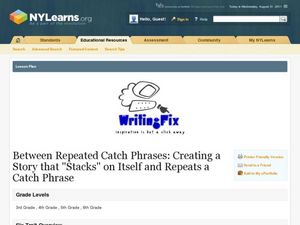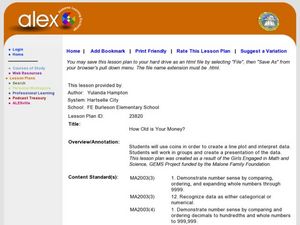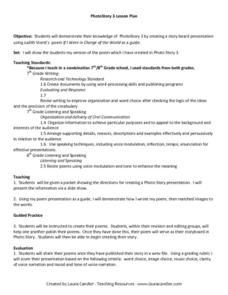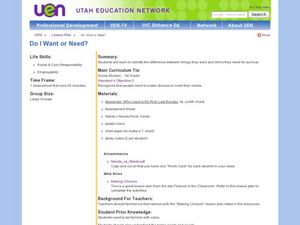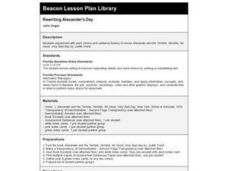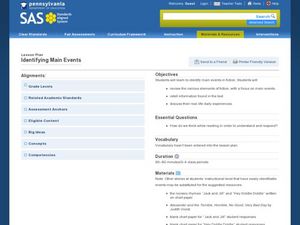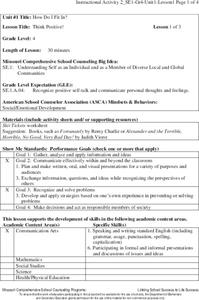Curated OER
Introduce Vocabulary: Alexander, Who Use to be Rich Last Sunday (Viorst)
Although this vocabulary-in-context activity is focused on Judith Viorst's book Alexander, Who Use to Be Rich Last Sunday, the strategy can be applied to any book budding learners read with you. First, introduce the three new words you...
Curated OER
Compare and Contrast Author's Voice
Follow the procedural details here to model for your class how to identify author's voice in two poems, "Since Hannah Moved Away" by Judith Viorst and Mirriam Chaikin's "I Hate Harry." Together, determine voice and the words that reveal...
Curated OER
Creating a Story that "Stacks" on Itself and Repeats a Catch Phrase
Young scholars explore language arts by reading a classic children's story in class. In this story structure lesson, students read the Judith Viorst book, Alexander and the Terrible, Horrible, No Good, Very Bad Day. Young scholars...
Curated OER
Alexander and the Terrible, Horrible, No-Good, Very Bad Day
Second graders interact with the story of Alexander's horrible day by connecting it to their lives. They practice predicting, writing paragraphs, reading aloud, discussing his problems, making a card to cheer him up, and designing a pair...
Curated OER
How Rich Is Rich?
Second graders read "Alexander, Who Used to Be Rich, Last Sunday" by Judith Viorst. They watch a video of the book and identify and record amounts of money mentioned in the story. They investigate money-related websites.
Alabama Learning Exchange
How Old is Your Money?
Elementary learners explore coin mint dates. First, they listen to the book Alexander Who Used to be Rich Last Sunday by Judith Viorst. They then sort a collection of coins according to their mint date and put them in order from oldest...
Curated OER
Literature Based Money Countdown Challenge
In this money worksheet, students complete two tables using the references to money in two pieces of children's literature. They work with Judith Viorst's, Alexander, Who Used to Be Rich Last Sunday and Shel Silverstein's poem, "Smart."
Curated OER
Alexander, Who Used to be Rich Last Sunday
What a great way to incorporate Judith Viorst's story, Alexander, Who Used to Be Rish Last Sunday, with a math lesson on money. Second graders listen to the story being read while the teacher stops to record each time Alexander spends...
Curated OER
PhotoStory 3 Lesson Plan
In this instructional activity, PhotoStory 3, students create a story board of an original poem through the use of PhotoStory 3 presentation. Students write a poem and use it to develop their storyboard. Students publish and share...
Curated OER
The Horrible No Good Very Bad Day
First graders read Alexander and the Terrible Horrible No Good Very Bad Day, write sentence or paragraph about their experience with a bad day, and combine their work with that of classmates to create class book.
Curated OER
Making Choices
Second graders explore financial decision making. For this introductory economics lesson, 2nd graders listen to the book Alexander, Who Used to be Rich Last Sunday by Judith Viorst, and discuss making financial choices based on wants...
Curated OER
Do I Want or Need?
Young scholars explore wants and needs. In this introductory economics lesson, students use a "pinch card" to display whether a familiar item is a "want" or a "need". Young scholars listen to the book Alexander used to be Rich on...
Curated OER
"Alexander, Who Used to Be Rich Last Sunday" by Judith Viorst
Students figure out the probability that the penny's sixth toss be heads also. They figure the probability of having six coin tosses in a row all end on the same side.
Curated OER
Rewriting Alexander's Day
Students experiment with word choice and sentence fluency to revise Alexander and the Terrible, Horrible, No Good, Very Bad Day by Judith Viorst.
Curated OER
Growing Independence and Fluency Lesson: Ready, Set, Read Expressively!
Students practice becoming more fluent readers with fluency by assessing one minute reads and repeated readings. They also practice reading silently and then read the book, "Alexander and the Terrible, Horrible, No Good, Very Bad Day,"...
Curated OER
Text Clues and Background Knowledge
Teach youngsters how to evaluate background knowledge, pictures, and context clues to draw a reasonable conclusion about a story. They practice using the discussed clues as they read the story, Alexander and the Terrible, Horrible, No...
Curated OER
Excellent Expression
Learners practice reading more fluently with expression and enthusiasm by reading aloud to help them realize how much more exciting and inviting stories can be when read with expression. They encounter the book, "Alexander and the...
Curated OER
We love to Express Ourselves: Growing Toward Independence and Fluency
Reading with expression is an important component in developing fluency. Emerging readers learn different strategies for accomplishing this skill through the teacher's model reading of Earrings!. Partner practice is combined with...
Curated OER
Identifying Main Events
Help kindergartners learn to identify the main events in fiction. They will review elements of fiction, retell information found in the text, and discuss their real-life daily experiences. All the while, they will be asking themselves...
Missouri Department of Elementary
Think Positive!
Following an attention-grabbing read-aloud, scholars brainstorm ways they can change negative thoughts into positive thoughts. Small groups plan and perform a skit that showcases one of the new ideas to uplift one's feelings....
Curated OER
Some Days Are Like That!
Second graders engage in an activity of reading a story and have a discussion about the story to measure comprehension. The use of a graphic organizer helps student retention because it is brain compatible for students.
Curated OER
Children's Literature Across the Curriculum Ideas-If You Made A Million
Students read If You Made A Million by David M. Schwartz. They complete a variety of cross-curricular activities surrounding the study of earning, saving and spending money. Included are reading, art, math, science, writing, social...
Curated OER
My Writing Portfolio
Emerging writers create a portfolio showcasing various writing formats. They discuss Alexander and the Terrible, Horrible, No Good, Very Bad Day. They observe the key features of picture books and then create their own book to add to...
Curated OER
Money - Using R & R to Teach Mathematics
Second graders count up coins of money that add up to one dollar. In this money lesson plan, 2nd graders also spend money and keep track of how much they have spent.
Other popular searches
- Judith Viorst
- Judith Viorst Earrings
- Earrings by Judith Viorst
- Judith Viorst Alexander
- Judith Viorst + Earrings
- Judith Viorst My Mama
- Judith Viorst New Year
- Biographies on Judith Viorst
- Judith Viorst Lesson Plans




